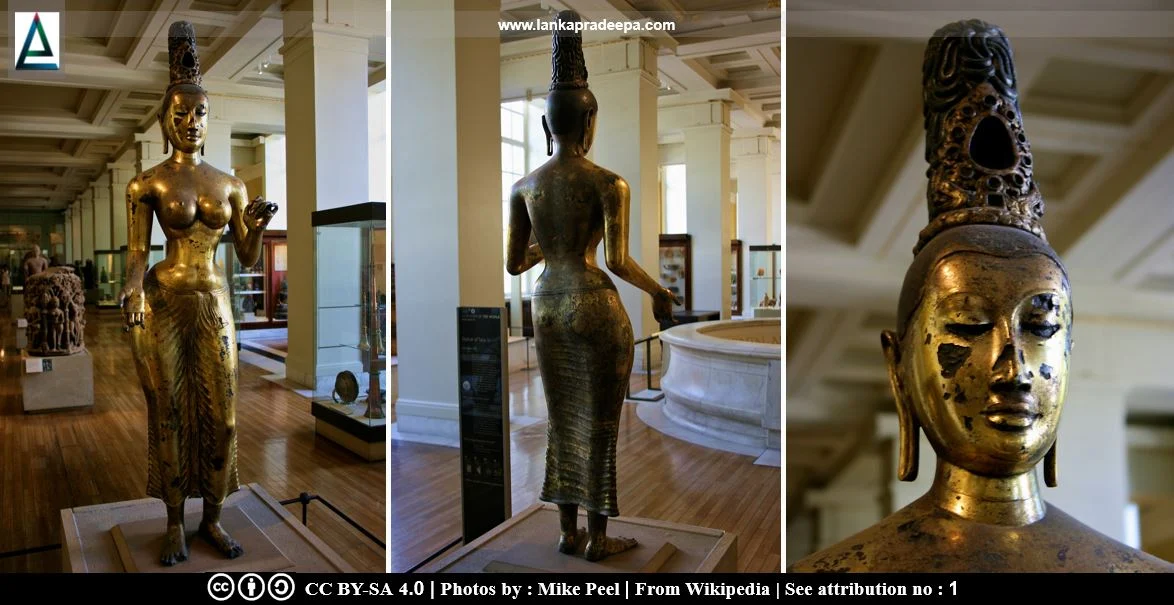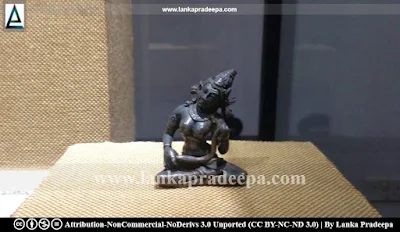
Tara Devi (Sinhala: ශ්රී ලංකාවේ තාරා දේවිය) is considered the most beloved goddess of the Mahayana Buddhist pantheon (Jayawardene, 2016). Although presently Sri Lanka is a Theravada Buddhist country, there is evidence to prove that the Mahayana culture was spreading in the country during the first millennium, especially from 3 century A.D. to 9th century A.D. Statues depicting the major Mahayana icons such as Avalokiteswara, Vajrapani, Manjusri, and Tara have been discovered from a number of localities in Sri Lanka.
Tara
Tara is a figure in Buddhism and she appears as a female Bodhisattva in Mahayana Buddhism, and as a female Buddha in Vajrayana Buddhism. She emerged in the history of India about the 6th century A.D. (Jayawardene, 2016). In early representations, she appeared alongside with Bodhisattva Avalokiteswara but by the mid of the 7th century, she has become the very embodiment of the principle of Buddhahood and is regarded as without equal as a liberator, protector, and saviour in both the Mahayana and Vajrayana teachings (Jayawardene, 2016). She became a part of the cultures of several Asian countries including Tibet, Nepal, Mongolia, India and Sri Lanka (Gunawardana, 2019).Tara in Sri Lanka
Tara started to appear in the society of Sri Lanka around the seventh or eighth century A.D. and was worshipped until the fifteenth century A.D. (Jayawardene, 2016). Evidence for Tara worship in Sri Lanka is found in
the Mihintale Slab Inscriptions of Mahinda IV (956-972 A.D.) where she is referred to as goddess Mininal (Gunawardana, 2019; Jayawardene, 2016; Wickremasinghe, 1912).
Tara is also called Biso Bandara by Sinhalese Buddhists (Gunawardana, 2019). The 14th century Tisara Sandeshaya treats her as Tārā Bisō (Gunawardana, 2019).
Tara statues in Sri Lanka
The presence of Tara statues in Sri Lanka was acknowledged late (Jayawardene, 2016). Based on a comparative study, P.E.P. Deraniyagala identified three bronze images of Tara in 1951 that were mistakenly known as images of Goddess Pattini (Jayawardene, 2016). Thereafter, several scholars such as V. Schroeder, D.K. Dohanian, N. Mudiyanse, A.D.T.E. Perera, N. Wijesekara, L. Prematileke, O. Bopearachchi published articles regarding Tara heritage in the country (Dohanian, 1983; Gunawardana, 2019; Jayawardene, 2016).The Tara Devi in the British Museum is considered the best-known Tara statue produced in Sri Lanka (Jayawardene, 2016). The largest figure of Tara in the country is found in Buduruwagala (Gunawardana, 2019).
This is an incomplete list prepared by "Lanka Pradeepa".
| No. | Location | Remarks | References |
| 1 | Tara (standing), Buduruwagala Viharaya (Monaragala District) |
The largest figure of Tara. Nearly 40 ft. in height. 6-9th centuries A.D. |
Gunawardana, 2019 |
| 2 | Tara (seated), British Museum (Sri Lanka) |
Solid cast gilt-bronze of about 15 cm in height. 7-8th centuries A.D. Removed from Sri Lanka by Hugh Nevill in 1886. |
The British Museum (1898,0702.142) |
| 3 | Tara Statue (standing), British Museum (East coast of Sri Lanka) |
A solid cast in bronze and gilded. 1.43 m in height. c. 8th century A.D. Removed from Sri Lanka by Sir Robert Brownrigg in 1820. |
The British Museum (1830,0612.4) |
| 4 | Nila Tara (standing), Vijayarama Monastery (Anuradhapura District) |
The latter part of the 9th century A.D. |
Gunawardana, 2019 |
| 5 | Tara (standing), British Museum (Sri Lanka) |
A bronze figure of a female deity, probably Tara. 4.7 cm in height. 10th century A.D. Removed from Sri Lanka by Hugh Nevill in 1886. |
The British Museum (1898,0702.139) |
| 6 | Tara (standing), British Museum (Sri Lanka) |
A bronze four-armed female figure, possibly Tara. 16.9 cm in height. 10th century A.D. Removed from Sri Lanka by Hugh Nevill in 1886. |
The British Museum (1898,0702.140) |
| 7 | Astamahabhaya Tara, British Museum (Sri Lanka) |
Bronze. 7.6 cm in height & 2 inches in width. 10th century A.D. |
The British Museum (1898,0702.132) |
| 8 | Kurunegala Tara (seated), Colombo National Museum (Kurunegala District) |
Solid cast and silver alloyed. 20 cm in height. 10th century A.D. |
Gunawardana, 2019 |
| 9 | Mala Tara (seated), Colombo National Museum (Mannar District) |
Discovered in 1957 near the Mannar lighthouse. 5.4 cm in height. 10th century A.D. |
Gunawardana, 2019 |
| 10 | Tara (seated), Manabharana Viharaya (Monaragala District) |
Discovered in 2012. The height of the statue is 11 cm |
Gunawardana, 2019 |
| 11 | (1) Tara (standing), Tiriyaya (Trincomalee District) |
Discovered in 1983 |
Gunawardana, 2019 |
| 12 | (2) Tara (standing), Tiriyaya (Trincomalee District) |
Discovered in 1983 |
Gunawardana, 2019 |
| 13 | Tara (standing), Abhayagiriya Museum (Anuradhapura District) |
Discovered from a Padanghara to the northeaster side of Ruwanweliseya. 14.5 cm in height |
Gunawardana, 2019 |
| 14 | Tara (seated), Abhayagiriya Museum (Anuradhapura District) |
Discovered from the Digapashana area at Abhayagiriya. 5 cm in height |
Gunawardana, 2019 |
| 15 | Thribanga Tara (standing), Abhayagiriya Museum (Anuradhapura District) |
18.6 cm in height |
Gunawardana, 2019 |
| 16 | Tara (head), Yatala Museum (Hambantota District) |
The hair is in the ascetic style of Jatāmakūta. |
Gunawardana, 2019 |
| 17 | Tara (head), Yatala Museum (Hambantota District) |
The head cannot be clearly identified. |
Gunawardana, 2019 |
| 18 | Tara, Pasgama Devalaya (Kandy District) |
15th Century | Jayawardene, 2016 |
| 19 | Tara, Vegiriya Devalaya (Kandy District) |
16th century | Jayawardene, 2016 |
Attribution
1) Statue of Tara, British Museum 4, Statue of Tara, British Museum 2, & Statue of Tara, British Museum 3 by Mike Peel are licensed under CC BY-SA 4.0
References
1) Dohanian, D.K., 1983. Sinhalese Sculptures in the Pallava Style. Archives of Asian Art, 36, pp.6-21.
2) Gunawardana, N., 2019. Identify the statues of Goddess Tārā in Sri Lanka and Evaluate the Importance with Trade. International Journal of Scientific and Research Publications, 9(9), pp.404-410.
3) Jayawardene, S., 2016. Sri Lanka's Tārā Devī. Journal of the Royal Asiatic Society of Sri Lanka, 61(2), pp.1-30.
4) Wickremasinghe, D.M.D.Z.,
1912. Epigraphia Zeylanica: Being lithic and other inscription of
Ceylon (Vol. I). London. Archaeological Survey of Ceylon. p.103.
This page was last updated on 10 October 2022



